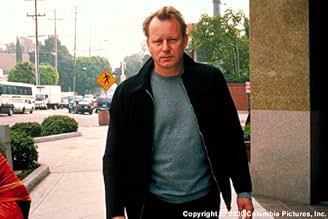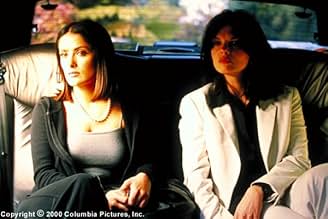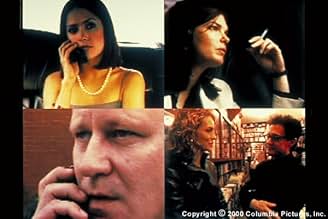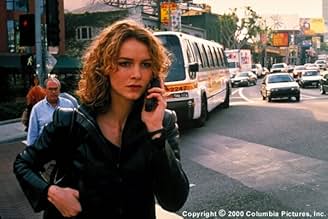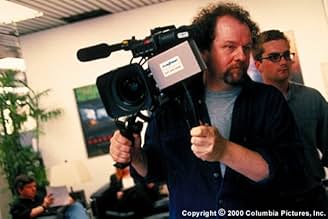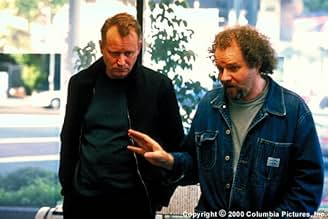IMDb RATING
6.0/10
7.3K
YOUR RATING
Four frames of simultaneous action that alternately follow a smitten lesbian lover as she obsesses over her partner's dalliances and the tense goings-on of a Hollywood film production compan... Read allFour frames of simultaneous action that alternately follow a smitten lesbian lover as she obsesses over her partner's dalliances and the tense goings-on of a Hollywood film production company.Four frames of simultaneous action that alternately follow a smitten lesbian lover as she obsesses over her partner's dalliances and the tense goings-on of a Hollywood film production company.
- Awards
- 2 nominations total
- Director
- Writer
- All cast & crew
- Production, box office & more at IMDbPro
Featured reviews
In an age where top-rated films involve Australians in xenophobic, concocted histories, or should-know-better Oscar winners in films about nicking cars, innovation seems rarely welcome.
It comes as no surprise then that the first film to be told via four separate panels on the screen, with continuous 93m takes and improvisation should only be shown on one single screen in the whole of the West Midlands.
What did surprise me, however, is that the film isn't that good. It is above average, though is too mainstream to really appeal to the artset, and too arty to interest a mainstream audience. The attention is directed around the four separate panels by virtue of judicious sound editing; dips and fades occurring throughout.
Of the four panels, while their fixations may merge or change, generally speaking they take the following form: the top two are the serious ones, the upper left seeing Lauren Hathaway (Jeanne Tripplehorn) using surveillance to listen in on her girlfriend's conversations, whom she (correctly) suspects is having an affair. The upper right is the dullest, a meandering affair with the self-absorbed Emma (Saffron Burrows) who goes through counselling and has very little interaction or involvement with the rest of the film.
Lower left are the cast-offs, often sharing perspective with its adjacent panels and mostly being used for light relief. Lower right, arguably the most interesting, is centred on a movie production meeting which allows for some industry parodies. These include movies such as "Time Toilet", "Bitch" and a hip-hop Soviet incidental music that offers "Can you dig it - Trotsky in da house!"
I did chuckle at the Asian staff member whose name - Connie Ling - produces sniggers when introduced, though Onyx Richardson's (Golden Brooks) assertion that black people get short shrift in film seems hollow when you consider the only thing her character gets to talk about is her colour, and that she's the only black cast member. The film's lesbian relationships also seem only there for titillation. Lastly, when you meet a character who pitches a film based around four separate panels and continuous takes (dismissed by a committee member as "pretentious s***") you realise that this film either isn't as clever as it thinks it is or too clever by half. Without the gimmickry - and it could easily get by with only half of it's four screens - this would be a forgettable 4. Therefore, isn't it a pity that the innovation wasn't applied to a better movie? 6/10.
It comes as no surprise then that the first film to be told via four separate panels on the screen, with continuous 93m takes and improvisation should only be shown on one single screen in the whole of the West Midlands.
What did surprise me, however, is that the film isn't that good. It is above average, though is too mainstream to really appeal to the artset, and too arty to interest a mainstream audience. The attention is directed around the four separate panels by virtue of judicious sound editing; dips and fades occurring throughout.
Of the four panels, while their fixations may merge or change, generally speaking they take the following form: the top two are the serious ones, the upper left seeing Lauren Hathaway (Jeanne Tripplehorn) using surveillance to listen in on her girlfriend's conversations, whom she (correctly) suspects is having an affair. The upper right is the dullest, a meandering affair with the self-absorbed Emma (Saffron Burrows) who goes through counselling and has very little interaction or involvement with the rest of the film.
Lower left are the cast-offs, often sharing perspective with its adjacent panels and mostly being used for light relief. Lower right, arguably the most interesting, is centred on a movie production meeting which allows for some industry parodies. These include movies such as "Time Toilet", "Bitch" and a hip-hop Soviet incidental music that offers "Can you dig it - Trotsky in da house!"
I did chuckle at the Asian staff member whose name - Connie Ling - produces sniggers when introduced, though Onyx Richardson's (Golden Brooks) assertion that black people get short shrift in film seems hollow when you consider the only thing her character gets to talk about is her colour, and that she's the only black cast member. The film's lesbian relationships also seem only there for titillation. Lastly, when you meet a character who pitches a film based around four separate panels and continuous takes (dismissed by a committee member as "pretentious s***") you realise that this film either isn't as clever as it thinks it is or too clever by half. Without the gimmickry - and it could easily get by with only half of it's four screens - this would be a forgettable 4. Therefore, isn't it a pity that the innovation wasn't applied to a better movie? 6/10.
"Timecode" is not conventional filmmaking, which is the whole beauty of it. This is a totally improvised piece of cinema, shot on a hand-held camera for 90 minutes straight--not a single cut--and shot in real-time. Every word of dialogue is improvised, the only thing written is the story (also by Mike Figgis). The way it turned out is quite impressive. Of course, the process gets tiresome and repetitive at times, but overall it's a pretty fascinating work that will probably be better appreciated by the more open-minded moviegoer--as opposed to mainstream viewers who will probably view this as just plain weird.
I was really impressed by the talented cast filled with great actors who simply went through the WHOLE ENTIRE process without once messing up. If you watch all these behind-the-scenes specials with actors stumbling line-after-line, doing take-after-take, until they finally get it right the 100th time--it's astounding to see that the whole cast was able to pull this off without a scratch. Even with such talented actors like Stellan Sarsgard, Holly Hunter, Salma Hayek, Jeanne Tripplehorn, etc., I have to commend them especially for taking part in this risky project. This movie not only showcases their knacks for acting, but also their potential to try something new, innovative and quite difficult--after all, taking risks is one of the main elements in becoming a good actor.
This type of format does--at points--feel like a theatrical version of a "Big Brother" episode, but Figgis wrote a story with as much intriguing elements as he can possibly fit into a film of this scope. After all, this is supposed a day-in-the-life type of story and you don't want to be too far-fetched. So he tries to generate as much suspense and intrigue (involving the many smutty attributes of the stereotypical white-collar LA resident) as he possibly could. There are subplots involving drug abuse, alcohol abuse, homosexuality, philandering, jealousy and of course the biggest theme of all...Sex! Naturally, my interest did sometimes drift, but the material compelled me enough to be interested for the majority of the running time. I've never been a fan of those corny reality shows. Quite frankly, I think the kind of reality displayed on those programs is very dull. "Timecode" transcends the dullness of the reality shows and, in a way, the "Blair Witch Project" (which is another reality-based film shot entirely on a hand-held camera, but executed very poorly). The material is engaging to a degree, the actors perform it very well and everything is down-to-earth to preserve its sense of realism. My only criticisms lie in the "earthquake effects." Those looked totally cheesy, created entirely by camera tricks and actors pretending to be shaken up. In one of the closing scenes, Jeanne Tripplehorn is clinging on to a nearby bannister while you can see cars in the background moving along smoothly. He could've done without that pretentious trick.
I'm not saying this a great film, but it is one I'll remember for its unique sense of style and I will always remember Mike Figgis for coming up with this innovative method. If you're tired of mainstream cinema and feel anxious to see something new and exciting--this is a film I would recommend.
My score: 7 (out of 10)
I was really impressed by the talented cast filled with great actors who simply went through the WHOLE ENTIRE process without once messing up. If you watch all these behind-the-scenes specials with actors stumbling line-after-line, doing take-after-take, until they finally get it right the 100th time--it's astounding to see that the whole cast was able to pull this off without a scratch. Even with such talented actors like Stellan Sarsgard, Holly Hunter, Salma Hayek, Jeanne Tripplehorn, etc., I have to commend them especially for taking part in this risky project. This movie not only showcases their knacks for acting, but also their potential to try something new, innovative and quite difficult--after all, taking risks is one of the main elements in becoming a good actor.
This type of format does--at points--feel like a theatrical version of a "Big Brother" episode, but Figgis wrote a story with as much intriguing elements as he can possibly fit into a film of this scope. After all, this is supposed a day-in-the-life type of story and you don't want to be too far-fetched. So he tries to generate as much suspense and intrigue (involving the many smutty attributes of the stereotypical white-collar LA resident) as he possibly could. There are subplots involving drug abuse, alcohol abuse, homosexuality, philandering, jealousy and of course the biggest theme of all...Sex! Naturally, my interest did sometimes drift, but the material compelled me enough to be interested for the majority of the running time. I've never been a fan of those corny reality shows. Quite frankly, I think the kind of reality displayed on those programs is very dull. "Timecode" transcends the dullness of the reality shows and, in a way, the "Blair Witch Project" (which is another reality-based film shot entirely on a hand-held camera, but executed very poorly). The material is engaging to a degree, the actors perform it very well and everything is down-to-earth to preserve its sense of realism. My only criticisms lie in the "earthquake effects." Those looked totally cheesy, created entirely by camera tricks and actors pretending to be shaken up. In one of the closing scenes, Jeanne Tripplehorn is clinging on to a nearby bannister while you can see cars in the background moving along smoothly. He could've done without that pretentious trick.
I'm not saying this a great film, but it is one I'll remember for its unique sense of style and I will always remember Mike Figgis for coming up with this innovative method. If you're tired of mainstream cinema and feel anxious to see something new and exciting--this is a film I would recommend.
My score: 7 (out of 10)
Mike Figgis does a Robert Altman. Except, instead of creating a large narrative of interconnecting plot strands, he puts them all on four split screens. Is this therefore more subversive than Altman? I don't think so - Altman's method is an attack on Hollywood linearity, on conventional methods of 'connection'; his characters exist is the same space but are emotionally etc. miles apart. The characters in 'Short Cuts', like the city of L.A. itself, are a mass without a centre. Figgis, for all the supposed diffusion of his visual strands, actually reunites, glues together Altman's ruptures. In this way it might seem a more optimistic kind of film. It isn't.
'timecode' is being touted as a revolution in cinema, a new way of watching films. Instead of watching one screen and being led by a director, we are given four, and asked to make our choices. I was surprised at how panicked I was at this in the first 20 minutes, darting between scenes, wondering which one I should follow. This forced me out of the film much more disturbingly than anything by Fassbinder or Godard. But this alienation is deceptive. Firstly we are not really bombarded by four narratives - put 'pierrot le fou', 'diary of a country priest', 'vampyr' and 'branded to kill' on four screens, then you'd be confused. Figgis leads you all the way, gives you an illusion of choice, but rarely fulfils it. The focus is on one screen at a time - either the soundtrack is turned up loudest, the plot is more interesting, whatever. For long periods of time, you can safely ignore other scenes because there is nothing going on - for about 20 minutes, for example, Lauren sits in a limousine listening to a bug planted on Rose; this leaves us free to watch another screen and see what she's listening to. Other scenes are merely tedious - eg Emma droning to her shrink (a nod to Godard's 'week end', that famous end of cinema?) - so that you gladly look elsewhere. It is possible to listen to one scene, and flit around at the others to catch up on what's going on.
What I'm saying is, 'timecode' is not a difficult experience - after the initial adjustment, you watch the film as you would any other, especially as all the stories converge and are really only one story. Even at the beginning, the feeling is less one of Brechtian alienation than akin to being a security guard faced with a grid of screens - you rarely think about the physical processes of film or performance, as you would in a Dogme or Godard film.
So if 'timecode' is less revolutionary than it seems, that doesn't mean it isn't a brilliant film, a real purse in a pig's ear of a year (or whatever the expression is). One reason for this is the four-screen structure: I would have to watch it a few more times, but I was very conscious of the orchestration of the screens, the way compositions, or camera movements, or close-ups etc., in one screen were echoed, reflected, distorted in the others - a true understanding of this miraculous formal apparatus would, I think, give us the heart of the film, and bely the improvised nature of the content. Figgis is also a musician - he co-composed the score - and the movement here, its fugues and variations are truly virtuosic, almost worthy of my earlier Altman comparison.
But the content is great fun too. At first I was disappointed at the self-absorbed drabness of the material, the idea that we shouldn't be made to work too hard because we've enough to deal with the four screens. And, it is true, that the stories rarely transcend cliche. But, such is the enthusiasm of the performers (people like Salma Hayek obviously relishing slightly more useful roles than the bilge they're usually stuck in); the precision of the structure; the mixture of comedy and pathos, and the way the style facilitates both, that you're convinced you're watching a masterpiece. Quentin's massaging and Ana's pitch are two of the funniest things I've seen in ages, while Stellan Skarsgard's rich performance stands out all the more for its brittle surroundings.
'timecode' is being touted as a revolution in cinema, a new way of watching films. Instead of watching one screen and being led by a director, we are given four, and asked to make our choices. I was surprised at how panicked I was at this in the first 20 minutes, darting between scenes, wondering which one I should follow. This forced me out of the film much more disturbingly than anything by Fassbinder or Godard. But this alienation is deceptive. Firstly we are not really bombarded by four narratives - put 'pierrot le fou', 'diary of a country priest', 'vampyr' and 'branded to kill' on four screens, then you'd be confused. Figgis leads you all the way, gives you an illusion of choice, but rarely fulfils it. The focus is on one screen at a time - either the soundtrack is turned up loudest, the plot is more interesting, whatever. For long periods of time, you can safely ignore other scenes because there is nothing going on - for about 20 minutes, for example, Lauren sits in a limousine listening to a bug planted on Rose; this leaves us free to watch another screen and see what she's listening to. Other scenes are merely tedious - eg Emma droning to her shrink (a nod to Godard's 'week end', that famous end of cinema?) - so that you gladly look elsewhere. It is possible to listen to one scene, and flit around at the others to catch up on what's going on.
What I'm saying is, 'timecode' is not a difficult experience - after the initial adjustment, you watch the film as you would any other, especially as all the stories converge and are really only one story. Even at the beginning, the feeling is less one of Brechtian alienation than akin to being a security guard faced with a grid of screens - you rarely think about the physical processes of film or performance, as you would in a Dogme or Godard film.
So if 'timecode' is less revolutionary than it seems, that doesn't mean it isn't a brilliant film, a real purse in a pig's ear of a year (or whatever the expression is). One reason for this is the four-screen structure: I would have to watch it a few more times, but I was very conscious of the orchestration of the screens, the way compositions, or camera movements, or close-ups etc., in one screen were echoed, reflected, distorted in the others - a true understanding of this miraculous formal apparatus would, I think, give us the heart of the film, and bely the improvised nature of the content. Figgis is also a musician - he co-composed the score - and the movement here, its fugues and variations are truly virtuosic, almost worthy of my earlier Altman comparison.
But the content is great fun too. At first I was disappointed at the self-absorbed drabness of the material, the idea that we shouldn't be made to work too hard because we've enough to deal with the four screens. And, it is true, that the stories rarely transcend cliche. But, such is the enthusiasm of the performers (people like Salma Hayek obviously relishing slightly more useful roles than the bilge they're usually stuck in); the precision of the structure; the mixture of comedy and pathos, and the way the style facilitates both, that you're convinced you're watching a masterpiece. Quentin's massaging and Ana's pitch are two of the funniest things I've seen in ages, while Stellan Skarsgard's rich performance stands out all the more for its brittle surroundings.
10neil_mc
I am pretty sure that I will not see a more jaw-dropping piece of film-making for quite some time. To put the complexity of filming 4 continuous takes simultaneously and in full co-ordination into any perspective, is extremely difficult. And then to have such a dramatic climax at the end of 93 improvised minutes is pretty mind-blowing.
I'm sure plenty of people will scream "pretentious crap" - as the girl suggests in her meeting speech - but the innovative brilliance of this film should be applauded above everything else. For example, little things like how the camera is focused on Skarsgard in the meeting while his wife is having it away with another woman. And then bigger things such as each screen simultaneously focusing in close-up on their characters eyes. Unbelievable.
I'm sure this isn't everybody's cup of tea - some people just don't appreciate the concept of doing something unique and risky. Some people even go as far as criticising Mike Figgis for attempting this - when in truth, this experiment was never likely to reach the masses, so any accusation of arrogance/pretension are pathetic.
As for the story and acting, I have a sneaky suspicion that maybe the sound was turned down on certain screens in post-production when actor's were fumbling or struggling for dialogue, I also thought the sound should have been muted from the other 3 screens while we were focused on one - because at times we get mumbling from all 4 at once, which doesn't work. But none of this detracts from a truly great achievement from all involved - for actors to go 93 minutes undisturbed is very impressive.
A perfectly constructed and co-ordinated film, I am in absolute awe. 10/10
I'm sure plenty of people will scream "pretentious crap" - as the girl suggests in her meeting speech - but the innovative brilliance of this film should be applauded above everything else. For example, little things like how the camera is focused on Skarsgard in the meeting while his wife is having it away with another woman. And then bigger things such as each screen simultaneously focusing in close-up on their characters eyes. Unbelievable.
I'm sure this isn't everybody's cup of tea - some people just don't appreciate the concept of doing something unique and risky. Some people even go as far as criticising Mike Figgis for attempting this - when in truth, this experiment was never likely to reach the masses, so any accusation of arrogance/pretension are pathetic.
As for the story and acting, I have a sneaky suspicion that maybe the sound was turned down on certain screens in post-production when actor's were fumbling or struggling for dialogue, I also thought the sound should have been muted from the other 3 screens while we were focused on one - because at times we get mumbling from all 4 at once, which doesn't work. But none of this detracts from a truly great achievement from all involved - for actors to go 93 minutes undisturbed is very impressive.
A perfectly constructed and co-ordinated film, I am in absolute awe. 10/10
I respect the challenge that this movie presented. Four cameras running in real time, with synchronized events? Wow. But without an engaging story the challenge is equivalent to building a replica of the Empire State Building out of matches. Impressive but pointless.
If you are a movie student it is worth seeing. Maybe you can turn this great idea into a real movie.
If you are a movie student it is worth seeing. Maybe you can turn this great idea into a real movie.
Did you know
- TriviaThe actors and actresses were responsible for their own costumes, hair, and make-up.
- GoofsCameraman reflected on an elevator door as he follows Emma after the therapist sequence.
- Alternate versionsThe film was transferred from digital video to film stock for theatrical presentation. The video release, however, uses the original digital video picture format.
- SoundtracksComfort Of Strangers
Written by Mike Figgis, Anthony Marinelli and Skin
Performed by Skin
Courtesy of Virgin Records Limited
By Arrangement with Red Mullet Ltd.
- How long is Timecode?Powered by Alexa
Details
Box office
- Budget
- $5,000,000 (estimated)
- Gross US & Canada
- $1,057,750
- Opening weekend US & Canada
- $93,148
- Apr 30, 2000
- Gross worldwide
- $1,431,406
- Runtime1 hour 37 minutes
- Color
- Sound mix
- Aspect ratio
- 1.85 : 1
Contribute to this page
Suggest an edit or add missing content



